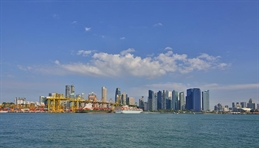
Singapore said it continues to make progress on the bunkering of biofuel and it has developed together with the industry and other stakeholders a provisional national quality standard for marine biofuel to boost the development of bunkering for this sustainable fuel.
The Maritime and Port Authority of Singapore (MPA) noted that approximately 70,000 tonnes of biofuel have been supplied in Singapore to ocean-going vessels across more than 40 biofuel bunkering operations.
"Currently, there is no international quality standard for biofuel as a marine fuel," it said in a statement.
Singapore is the world's leading bunkering port and the second-busiest port next to Shanghai.
Quality standard for marine biofuel
"As part of efforts to support the multi-fuel transition towards decarbonisation, MPA together with the industry, academia, and relevant government organisations under the national standardisation programme overseen by Enterprise Singapore, have developed a provisional national quality standard for marine biofuel to support the development of biofuel bunkering," MPA said.
It added that MPA has also developed a framework setting out conditions under which licensed bunker suppliers may supply biofuel within the Port of Singapore to support trials conducted by vessels.
On quantity assurance, it said it is working with the Technical Committee for Bunkering, to study the impact of biofuel on the metrological accuracy of Mass Flow Meters and is working with stakeholders to amend the SS 648: 2019 Code of Practice for Bunker Mass Flow Metering to include biofuels within its scope.
MPA added that it is also actively looking into the reduction of energy demand which can be pursued regardless of the choice of new marine fuels.
"This will help shipping companies reduce costs and lower carbon emissions."
On alternative fuels, LNG is a transition fuel and Singapore is ready to supply LNG bunker, with a total of 24 ship-to-ship transfer operations in 2021.
Singapore's second LNG bunker vessel, Brassavola, was christened this week as well.
MPA noted that as part of a multi-fuel future, methanol, ammonia and hydrogen derived from renewables and its carriers as well as biofuels could play significant roles in the decarbonisation of global shipping.
"MPA will continue to collaborate with public and private sector partners to accelerate the trials and adoption of these new fuels to support our domestic and international sustainability goals," it said.
Speaking at the 2022 Singapore International Bunkering Conference and Exhibition (SIBCON) — the world's largest forum for the marine fuel industry — Chee Hong Tat, senior minister of state for finance and transport, said that the Port of Singapore remained the top bunkering port in 2021 during the COVID-19 pandemic.
He added that looking ahead, the global environment has become more uncertain and Maritime Singapore needs to continue transforming to remain relevant as a global hub port and international maritime centre.
Chee outlined three key areas to kick start Singapore's decarbonisation journey, including enhancing services through digitalisation and providing quality assurance to guide Singapore's efforts to tackle the near-term challenges for the bunkering sector.
Meanwhile, the National Climate Change Secretariat is leading public consultation for the potential raising of our level of ambition to achieve net-zero emissions by 2050.
The push for the full electrification of local harbour craft and the use of biofuels will contribute to this national effort.
At the port-to-port level, MPA is working with like-minded ports such as the Port of Rotterdam to establish green and digital corridors and develop a global network.



